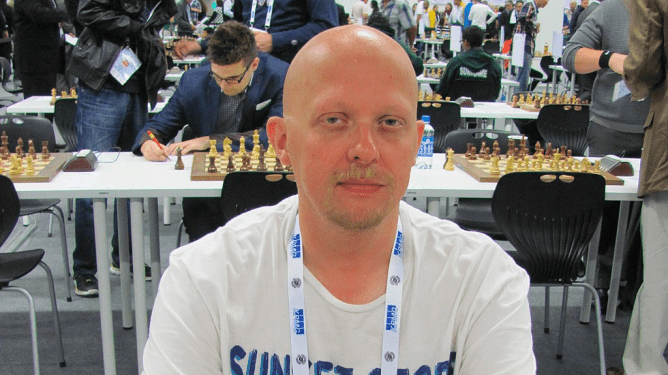
Belgian IM Handed 1-Year FIDE Ban After Refusing Body Scan
IM Stefan Docx has been handed a one-year ban from taking part in FIDE-rated tournaments after refusing a metal detector body scan during an incident in Spain. Docx was found not guilty of computer cheating and says he has appealed the suspension.
The 49-year-old, a three-time member of the Belgium Olympiad team, has been sanctioned for a year by FIDE's Ethics & Disciplinary Commission (EDC) for the incident that took place during the Benidorm Open in December last year. At the end of October, the full decision was published on the EDC's website.
Chess.com reported on the story back then, mentioning the rumors that had been floating around the Dutch and Belgian chess scene for a decade prior to the incident in Spain. In 2012, a Belgian club reported him for alleged cheating, but he was eventually cleared of the charges, according to Schaakfabriek.be.
At the Benidorm Open, the incident with Docx took place during the eighth round. Even though the tournament was not FIDE-rated, anti-cheating measures such as body scans were in place, as was the compulsory checking of coats, with special attention given by the arbiters to players who were away from the board.

Chief arbiter Ramon Garcia became suspicious of Docx after his frequent visits to the bathroom, and followed him. Garcia said he stayed in the bathroom area for 15 minutes, while Docx was inside one of the cubicles.
He stated that he saw clear reflections on the floor tiles, which he interpreted as light coming from a mobile phone in use.
After Docx returned to the tournament hall, he was confronted by arbiters who asked to scan him with a metal detector. The requests were refused, and when Docx continued to refuse even after being warned twice that he would be disqualified, he forfeited the game and did not play the final round. The arbiters did not find a mobile phone in the bathroom area.
In his reply to the EDC, the Belgian IM denied all allegations. He said he did not use a mobile phone and explained that he was sick that day and needed to go the bathroom several times. The allegations by Garcia were totally unfounded and false, he claimed.

Docx regrets that he did not submit to a scan from a metal detector during the round, but explains he was shocked by the unfounded allegations towards him and was also suffering from physical problems, according to his response to the EDC.
Following Garcia's report on the matter, an investigatory panel from FIDE's Fair Play Commission (FPL), consisting of GM Aleksandar Colovic, Richard Newman and Vincent Geeraets, investigated the matter. Their report focused primarily on alleged cheating by Docx.
The panel also received an analysis by IM Kenneth Regan, a professor at the State University of New York who has advised FIDE on computer cheating for years. He found nothing out of the ordinary in Docx' games in the tournament or from the past five years.
The investigatory panel considered two possible scenarios:
- Docx cheated by using a mobile phone and that is the reason he refused a metal scan.
- Docx did not cheat and refused the metal scan due to being surprised and not feeling well.
The panel came to the conclusion that the first scenario was the most likely and recommended a ban of two years from taking part in tournaments.
The EDC point out that computer-aided cheating is an increasingly problematic issue in chess and that it has the potential to damage the sport. They note:
The refusal of a player to undergo a scan without sufficient reason will unavoidably lead to well-founded cheating suspicions against that player. This is especially the case where all participants in a tournament in advance have been made aware of the security measures in force and that random checks can be made anytime.
A refusal to comply with the request of a scan is especially serious in cases like this one, where the CA did confront the Respondent with suspicions of cheating by using a mobile phone.
EDC calls Docx' conduct, and his refusal to submit to a body scan, "highly suspicious," but disagreed with the conclusion by the investigatory panel and found him not guilty of cheating:
Even if the Respondent´s conduct during round 8 of the event, especially his refusal to submit him to a check is highly suspicious, the EDC Chamber is not comfortably satisfied that the Respondent did consult a mobile phone during play. No one has observed the Respondent carrying or using a mobile device. The level of his play does not indicate any use of illegal assistance. Even if, on a balance of probabilities, the facts speak against the Respondent in this case, it has not reached the level of comfortable satisfaction. The Respondent must therefore enjoy the benefit of doubt and shall therefore not be found guilty of computer-aided cheating.
However, Docx' refusal to undergo a body scan, as requested by the arbiter, was "a serious breach of an important rule", the EDC notes.
The commission took into consideration that Docx was subject to a six-month suspension by the Belgian Chess Federation, and has issued him a ban of one year from taking part in FIDE-rated tournaments and chess-related activities as a player.
In response to a request for a comment by Chess.com, Docx says that he has appealed the ban: "I am satisfied that the commission concluded that all allegations of cheating were unfounded."
Docx does not want to make any further comments until the appeal has been decided.


